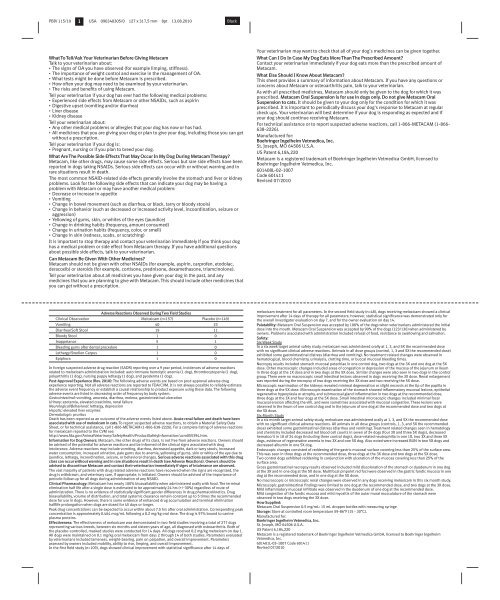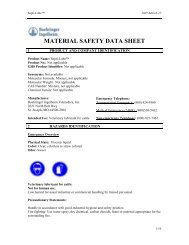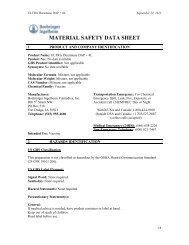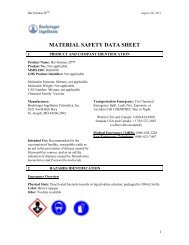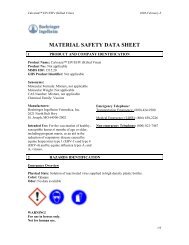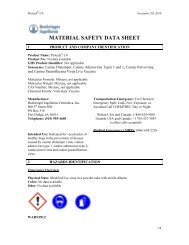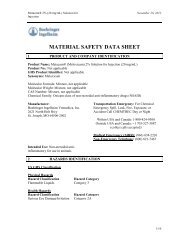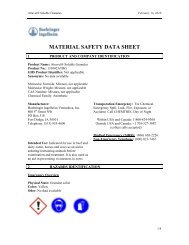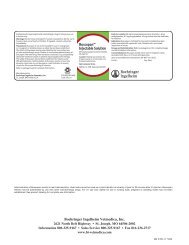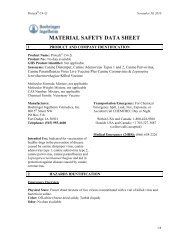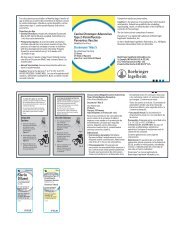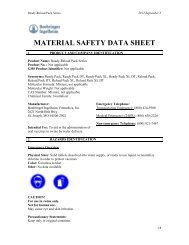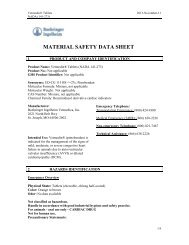Metacam® 0.5 Oral Suspension for Dogs - Boehringer Ingelheim ...
Metacam® 0.5 Oral Suspension for Dogs - Boehringer Ingelheim ...
Metacam® 0.5 Oral Suspension for Dogs - Boehringer Ingelheim ...
You also want an ePaper? Increase the reach of your titles
YUMPU automatically turns print PDFs into web optimized ePapers that Google loves.
PBIV 115/10 1 USA 090340305/0 127 x 317,5 mm 8pt 13.08.2010 BlackWhat To Tell/Ask Your Veterinarian Be<strong>for</strong>e Giving MetacamTalk to your veterinarian about:• The signs of OA you have observed (<strong>for</strong> example limping, stiffness).• The importance of weight control and exercise in the management of OA.• What tests might be done be<strong>for</strong>e Metacam is prescribed.• How often your dog may need to be examined by your veterinarian.• The risks and benefits of using Metacam.Tell your veterinarian if your dog has ever had the following medical problems:• Experienced side effects from Metacam or other NSAIDs, such as aspirin• Digestive upset (vomiting and/or diarrhea)• Liver disease• Kidney diseaseTell your veterinarian about:• Any other medical problems or allergies that your dog has now or has had.• All medicines that you are giving your dog or plan to give your dog, including those you can getwithout a prescription.Tell your veterinarian if your dog is:• Pregnant, nursing or if you plan to breed your dog.What Are The Possible Side Effects That May Occur In My Dog During Metacam Therapy?Metacam, like other drugs, may cause some side effects. Serious but rare side effects have beenreported in dogs taking NSAIDs. Serious side effects can occur with or without warning and inrare situations result in death.The most common NSAID-related side effects generally involve the stomach and liver or kidneyproblems. Look <strong>for</strong> the following side effects that can indicate your dog may be having aproblem with Metacam or may have another medical problem:• Decrease or increase in appetite• Vomiting• Change in bowel movement (such as diarrhea, or black, tarry or bloody stools)• Change in behavior (such as decreased or increased activity level, incoordination, seizure oraggression)• Yellowing of gums, skin, or whites of the eyes (jaundice)• Change in drinking habits (frequency, amount consumed)• Change in urination habits (frequency, color, or smell)• Change in skin (redness, scabs, or scratching)It is important to stop therapy and contact your veterinarian immediately if you think your doghas a medical problem or side effect from Metacam therapy. If you have additional questionsabout possible side effects, talk to your veterinarian.Can Metacam Be Given With Other Medicines?Metacam should not be given with other NSAIDs (<strong>for</strong> example, aspirin, carprofen, etodolac,deracoxib) or steroids (<strong>for</strong> example, cortisone, prednisone, dexamethasone, triamcinolone).Tell your veterinarian about all medicines you have given your dog in the past, and anymedicines that you are planning to give with Metacam. This should include other medicines thatyou can get without a prescription.Your veterinarian may want to check that all of your dog’s medicines can be given together.What Can I Do In Case My Dog Eats More Than The Prescribed Amount?Contact your veterinarian immediately if your dog eats more than the prescribed amount ofMetacam.What Else Should I Know About Metacam?This sheet provides a summary of in<strong>for</strong>mation about Metacam. If you have any questions orconcerns about Metacam or osteoarthritis pain, talk to your veterinarian.As with all prescribed medicines, Metacam should only be given to the dog <strong>for</strong> which it wasprescribed. Metacam <strong>Oral</strong> <strong>Suspension</strong> is <strong>for</strong> use in dogs only. Do not give Metacam <strong>Oral</strong><strong>Suspension</strong> to cats. It should be given to your dog only <strong>for</strong> the condition <strong>for</strong> which it wasprescribed. It is important to periodically discuss your dog’s response to Metacam at regularcheck ups. Your veterinarian will best determine if your dog is responding as expected and ifyour dog should continue receiving Metacam.For technical assistance or to report suspected adverse reactions, call 1-866-METACAM (1-866-638-2226).Manufactured <strong>for</strong>:<strong>Boehringer</strong> <strong>Ingelheim</strong> Vetmedica, Inc.St. Joseph, MO 64506 U.S.A.US Patent 6,184,220Metacam is a registered trademark of <strong>Boehringer</strong> <strong>Ingelheim</strong> Vetmedica GmbH, licensed to<strong>Boehringer</strong> <strong>Ingelheim</strong> Vetmedica, Inc.601408L-02-1007Code 601411Revised 07/2010Adverse Reactions Observed During Two Field StudiesClinical Observation Meloxicam (n=157) Placebo (n=149)Vomiting 40 23Diarrhea/Soft Stool 19 11Bloody Stool 1 0Inappetance 5 1Bleeding gums after dental procedure 1 0Lethargy/Swollen Carpus 1 0Epiphora 1 0In <strong>for</strong>eign suspected adverse drug reaction (SADR) reporting over a 9 year period, incidences of adverse reactionsrelated to meloxicam administration included: auto-immune hemolytic anemia (1 dog), thrombocytopenia (1 dog),polyarthritis (1 dog), nursing puppy lethargy (1 dog), and pyoderma (1 dog).Post-Approval Experience (Rev. 2010): The following adverse events are based on post-approval adverse drugexperience reporting. Not all adverse reactions are reported to FDA/CVM. It is not always possible to reliably estimatethe adverse event frequency or establish a causal relationship to product exposure using these data. The followingadverse events are listed in decreasing order of frequency by body system.Gastrointestinal: vomiting, anorexia, diarrhea, melena, gastrointestinal ulcerationUrinary: azotemia, elevated creatinine, renal failureNeurological/Behavioral: lethargy, depressionHepatic: elevated liver enzymesDermatologic: pruritusDeath has been reported as an outcome of the adverse events listed above. Acute renal failure and death have beenassociated with use of meloxicam in cats. To report suspected adverse reactions, to obtain a Material Safety DataSheet, or <strong>for</strong> technical assistance, call 1-866-METACAM (1-866-638-2226). For a complete listing of adverse reactions<strong>for</strong> meloxicam reported to the CVM see:http://www.fda.gov/AnimalVeterinary/SafetyHealth/ProductSafetyIn<strong>for</strong>mation/ucm055394.htm.In<strong>for</strong>mation <strong>for</strong> Dog Owners: Metacam, like other drugs of its class, is not free from adverse reactions. Owners shouldbe advised of the potential <strong>for</strong> adverse reactions and be in<strong>for</strong>med of the clinical signs associated with drugintolerance. Adverse reactions may include vomiting, diarrhea, decreased appetite, dark or tarry stools, increasedwater consumption, increased urination, pale gums due to anemia, yellowing of gums, skin or white of the eye due tojaundice, lethargy, incoordination, seizure, or behavioral changes. Serious adverse reactions associated with this drugclass can occur without warning and in rare situations result in death (see Adverse Reactions). Owners should beadvised to discontinue Metacam and contact their veterinarian immediately if signs of intolerance are observed.The vast majority of patients with drug related adverse reactions have recovered when the signs are recognized, thedrug is withdrawn, and veterinary care, if appropriate, is initiated. Owners should be advised of the importance ofperiodic follow up <strong>for</strong> all dogs during administration of any NSAID.Clinical Pharmacology: Meloxicam has nearly 100% bioavailability when administered orally with food. The terminalelimination half life after a single dose is estimated to be approximately 24 hrs (+/-30%) regardless of route ofadministration. There is no evidence of statistically significant gender differences in drug pharmacokinetics. Drugbioavailability, volume of distribution, and total systemic clearance remain constant up to 5 times the recommendeddose <strong>for</strong> use in dogs. However, there is some evidence of enhanced drug accumulation and terminal eliminationhalflife prolongation when dogs are dosed <strong>for</strong> 45 days or longer.Peak drug concentrations can be expected to occur within about 7.5 hrs after oral administration. Corresponding peakconcentration is approximately 0.464 mcg/mL following a 0.2 mg/kg oral dose. The drug is 97% bound to canineplasma proteins.Effectiveness: The effectiveness of meloxicam was demonstrated in two field studies involving a total of 277 dogsrepresenting various breeds, between six months and sixteen years of age, all diagnosed with osteoarthritis. Both ofthe placebo-controlled, masked studies were conducted <strong>for</strong> 14 days. All dogs received 0.2 mg/kg meloxicam on day 1.All dogs were maintained on 0.1 mg/kg oral meloxicam from days 2 through 14 of both studies. Parameters evaluatedby veterinarians included lameness, weight-bearing, pain on palpation, and overall improvement. Parametersassessed by owners included mobility, ability to rise, limping, and overall improvement.In the first field study (n=109), dogs showed clinical improvement with statistical significance after 14 days ofmeloxicam treatment <strong>for</strong> all parameters. In the second field study (n=48), dogs receiving meloxicam showed a clinicalimprovement after 14 days of therapy <strong>for</strong> all parameters; however, statistical significance was demonstrated only <strong>for</strong>the overall investigator evaluation on day 7, and <strong>for</strong> the owner evaluation on day 14.Palatability: Metacam <strong>Oral</strong> <strong>Suspension</strong> was accepted by 100% of the dogs when veterinarians administered the initialdose into the mouth. Metacam <strong>Oral</strong> <strong>Suspension</strong> was accepted by 90% of the dogs (123/136) when administered byowners. Problems associated with administration included refusal of food, resistance to swallowing and salivation.Safety:Six Week StudyIn a six week target animal safety study, meloxicam was administered orally at 1, 3, and 5X the recommended dosewith no significant clinical adverse reactions. Animals in all dose groups (control, 1, 3 and 5X the recommended dose)exhibited some gastrointestinal distress (diarrhea and vomiting). No treatment-related changes were observed inhematological, blood chemistry, urinalysis, clotting time, or buccal mucosal bleeding times.Necropsy results included stomach mucosal petechiae in one control dog, two dogs at the 3X and one dog at the 5Xdose. Other macroscopic changes included areas of congestion or depression of the mucosa of the jejunum or ileumin three dogs at the 1X dose and in two dogs at the 5X dose. Similar changes were also seen in two dogs in the controlgroup. There were no macroscopic small intestinal lesions observed in dogs receiving the 3X dose. Renal enlargementwas reported during the necropsy of two dogs receiving the 3X dose and two receiving the 5X dose.Microscopic examination of the kidneys revealed minimal degeneration or slight necrosis at the tip of the papilla inthree dogs at the 5X dose. Microscopic examination of the stomach showed inflammatory mucosal lesions, epithelialregenerative hyperplasia or atrophy, and submucosal gland inflammation in two dogs at the recommended dose,three dogs at the 3X and four dogs at the 5X dose. Small intestinal microscopic changes included minimal focalmucosal erosion affecting the villi, and were sometimes associated with mucosal congestion. These lesions wereobserved in the ileum of one control dog and in the jejunum of one dog at the recommended dose and two dogs atthe 5X dose.Six Month StudyIn a six month target animal safety study, meloxicam was administered orally at 1, 3, and 5X the recommended dosewith no significant clinical adverse reactions. All animals in all dose groups (controls, 1, 3, and 5X the recommendeddose) exhibited some gastrointestinal distress (diarrhea and vomiting). Treatment related changes seen in hematologyand chemistry included decreased red blood cell counts in seven of 24 dogs (four 3X and three 5X dogs), decreasedhematocrit in 18 of 24 dogs (including three control dogs), dose-related neutrophilia in one 1X, two 3X and three 5Xdogs, evidence of regenerative anemia in two 3X and one 5X dog. Also noted were increased BUN in two 5X dogs anddecreased albumin in one 5X dog.Endoscopic changes consisted of reddening of the gastric mucosal surface covering less than 25% of the surface area.This was seen in three dogs at the recommended dose, three dogs at the 3X dose and two dogs at the 5X dose.Two control dogs exhibited reddening in conjunction with ulceration of the mucosa covering less than 25% of thesurface area.Gross gastrointestinal necropsy results observed included mild discoloration of the stomach or duodenum in one dogat the 3X and in one dog at the 5X dose. Multifocal pinpoint red foci were observed in the gastric fundic mucosa in onedog at the recommended dose, and in one dog at the 5X dose.No macroscopic or microscopic renal changes were observed in any dogs receiving meloxicam in this six month study.Microscopic gastrointestinal findings were limited to one dog at the recommended dose, and two dogs at the 3X dose.Mild inflammatory mucosal infiltrate was observed in the duodenum of one dog at the recommended dose.Mild congestion of the fundic mucosa and mild myositis of the outer mural musculature of the stomach wereobserved in two dogs receiving the 3X dose.How Supplied:Metacam <strong>Oral</strong> <strong>Suspension</strong> <strong>0.5</strong> mg/mL: 15 mL dropper bottles with measuring syringeStorage: Store at controlled room temperature 59-86°F (15 - 30°C).Manufactured <strong>for</strong>:<strong>Boehringer</strong> <strong>Ingelheim</strong> Vetmedica, Inc.St. Joseph, MO 64506 U.S.A.US Patent 6,184,220Metacam is a registered trademark of <strong>Boehringer</strong> <strong>Ingelheim</strong> Vetmedica GmbH, licensed to <strong>Boehringer</strong> <strong>Ingelheim</strong>Vetmedica, Inc.601401L-03-1007 Code 601411Revised 07/2010


